Cat breathing heavy, what to do?
Does your cat appear to be in extremely severe respiratory distress? In that case you should immediately take your breathing heavy cat to your vet. If it is not too extreme, you can read the text below. That way you can understand what is happening if your cat is breathing heavy. In any case, make sure that your cat is in the coolest room of the house when the weather is warm and where he still feels comfortable. Make sure that he is not bothered by other pets. And that he does not have to move a lot to get to food and water. This way, his body uses the least oxygen. Hopefully he has the opportunity to slow down his breathing.
Why is my cat breathing strangely?
Why your cat is breathing strangely or even breathing heavy obviously depends on the cause. And yes, we understand you want to hear it from us. But unfortunately it’s not that easy. First you will receive some explanation from us about how the lungs and airways work and what can cause shortness of breath. With this information you can hopefully determine later in this article what the cause of your cat’s shortness of breath may be.
How do the airways and lungs work?
You can think the lungs and airways are a bit like a balloon. The convex side of a balloon sits in the chest cavity and the nozzle is the windpipe. Now is that tute actually a bit longer and the balloon itself also contains all kinds of tubes that bring the air into all the small balloons, the alveoli. We call these smaller tubes bronchi and bronchioles.
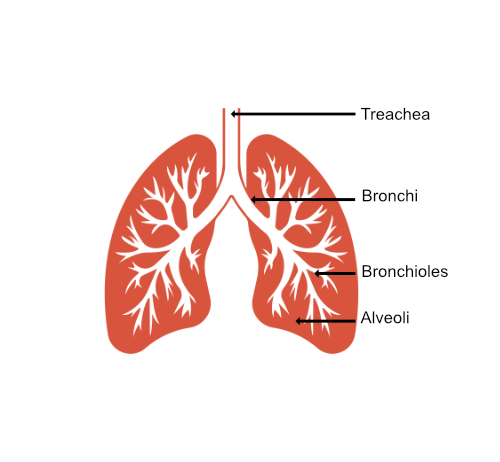
The air is therefore brought into the alveoli via the trachea, bronchi and bronchioles. Any of those access tubes can be blocked for some medical reason. The air can therefore not pass through the tubes (properly).
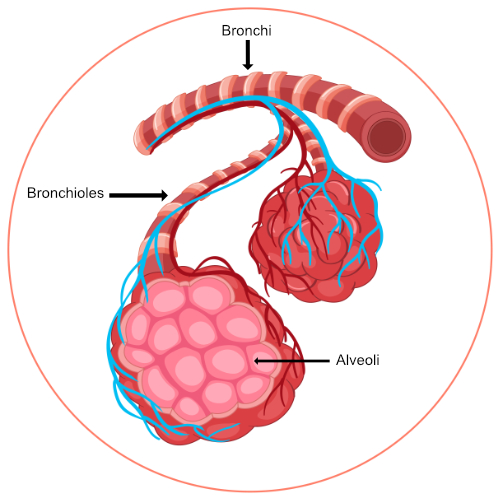
Above you see a schematic representation of an alveoli. There are a lot of them in each lung, but they all do the same thing. There are blood vessels around the alveoli that must absorb oxygen from the supplied air and release waste products such as CO2 into that air. The alveoli must therefore have as large a surface area as possible so that they can have as many blood vessels around them as possible. And the wall of the alveoli should not be too thick, otherwise oxygen and CO2 cannot pass through.
The air therefore enters the alveoli via the airways. Oxygen from the air is delivered through the wall of the alveoli to the blood vessels surrounding the alveoli. And the CO2 is released from the blood in the blood vessel to the wall of the alveoli and from there back to the air in the alveoli. The air is then exhaled and the process can then start again. So there are quite a few parts where things can go wrong when your cat is breathing heavy.
When should I worry about my cat breathing heavy?
When your cat gets the signal in his brain that he is not getting enough oxygen and is holding too much CO2, your lungs will receive the signal from your brain that they need to “ventilate” more. So your cat has to breathe more often. The number of breaths per minute then increases. Normally they breathe about 10-30 times per minute depending on whether they are active or sleeping. But if they have a lack of oxygen, this becomes much more.
As soon as your cat really suffers from a severe shortage of oxygen, it will restrict its movements in order to save oxygen. But at the same time he will start breathing through his mouth instead of through his nose. If he still does not have enough oxygen, you will see his pupils dilate and he will place his (front) legs wide apart. In this way, he stretches his chest a little, as it were, so that there is more room for the alveoli to open and thus contain more air.
In many cases you will also see that your cat is trying to cough, but that is not always the case.
What can cause your cat breathing heavy
There are several possibilities that can cause your cat breathing heavy. For example, there may be a blockage of the trachea. For example, if something has shot into his windpipe and causes him to suffocate. But the bronchi or bronchioles can also be the problem. They can either contain a lot of mucus because a virus is involved, for example a cat flu virus. Either the wall of the bronchi and bronchioles can become thickened or they contract a bit, causing the inner tube to have a smaller diameter. Less air can then be transported through it and it takes more effort to get enough air in. We especially see this when a cat has bronchitis or asthma.
But it is also possible that the alveoli wall has thickened and oxygen and CO2 can no longer be exchanged properly with the blood vessels. We see this, for example, with pneumonia.
And finally, it may be that the lungs, and therefore also the alveoli, can no longer expand because fluid or gas has accumulated around the lungs. But it is also possible that a hernia has developed in the diaphragm. This is the muscle that stretches the lungs, causing them to suck in air. This mainly occurs after your cat has had a collision with a vehicle. You can estimate the chance that this happened to your cat by looking at his nails. Are the tips of the nails frayed? Then there is a good chance that he has had a collision.
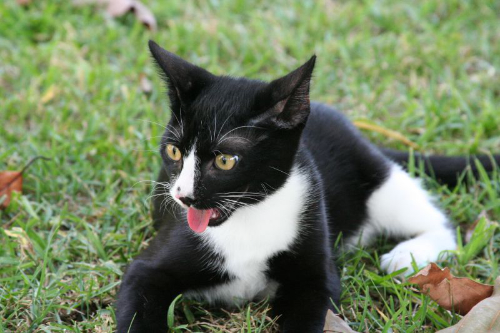
Cat breathing heavy with its mouth open
As we said above, a cat will only breathe with an open mouth if he can no longer breathe sufficiently through its nose. If he is otherwise calm when he breathes through his mouth, then there is no reason for acute panic. In case of cat flu, for example, we see that a cat has a stuffy nose. Then he can still breathe normally through his mouth.
But is your cat breathing with its mouth open and otherwise still very uncomfortable? Then he probably still doesn’t get enough oxygen in the blood vessels around the alveoli. In that case it can become life-threatening. You should therefore call your vet as soon as possible and visit him or her immediately. They have (in most cases) an oxygen device that can provide your cat with air that contains more oxygen than normal air. From that moment on, your vet can look for the cause of your cat’s shortness of breath.
Cat breathing heavy with its mouth open and drools
If your cat is in severe respiratory distress and has to make a lot of effort to get oxygen, he may not be wasting his time swallowing saliva. He will then start drooling. But it is also possible that he has a blockage in his trachea and throat that prevents the saliva from being swallowed. It is therefore important that you take your cat to your vet to have it examined.
Your cat is breathing heavy and with noise
Do you hear a gurgling sound while your cat is breathing and does he seem to be breathing heavy? In that case, there is likely a build-up of mucus in his airways due to an infection or inflammation. It is best to take your cat to your vet to have it examined. If he is not extremely breathing heavy, you can also try to see whether sensipharm pulmitranq helps to clear his mucus. But in that case, your cat should not breathe too heavy!
Cat breathing heavy and caughing
In almost all cases with cats breathing heavy, the cat will also start to cough. Your cat tries to “blow away” the mucus from the alveoli, bronchioles, bronchi and trachea so that the opening of the airways becomes larger again and more breathing air can be transported. Coughing is caused by a reflex that is triggered by irritation from the airways.
Cat breathing heavy with cat flu
You should actually think of cat flu as a bad cold as we humans can have. In case of cat flu, the symptoms can be very mild, but also very severe. The poorer your cat’s (or kitten’s) immune system works, the more severe the cat flu viruses can strike. Cat flu mainly causes a stuffy nose and a lot of mucus in the trachea. In addition, eye infections and problems with eating can also occur because they no longer smell well and sometimes develop sores in the mouth. The symptoms of cat flu are also much less if your cat is vaccinated against it every year.
Your old cat is breathing heavy
In this case, unfortunately, it is almost always quite serious. Your old cat has a poorer immune system than when he was young. It could therefore be a form of cat flu that is now plaguing your cat and that has taken a serious form.
But in most cases, in old cats there is an accumulation of fluid between the ribs and lung tissue. This is caused, for example, by heart failure. In that case, his heart cannot pump enough blood to remove the fluid from the tissues where he previously pumped the fluid in to feed the tissue. In that case, the fluid mainly accumulates in the space between the lungs and the ribs. This prevents the lungs from opening and therefore have less space to do their work.
In addition, it also happens quite regularly that there is a tumor in your cat’s chest that limits the lungs’ ability to function. If you have an old cat, it is always necessary to take your heavy breathing cat to your vet to determine the cause.
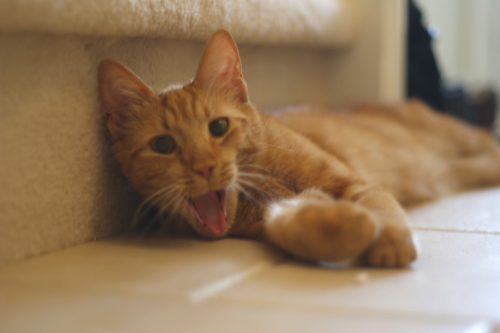
Your cat is breathing heavy and has a blown-up belly
If your cat also has a big belly, this may be a sign that fluid has also accumulated in the abdominal cavity, again due to the heart problem. But a large tumor may also be there and it may in turn have spread to the lungs so that your cat can no longer breathe properly.
If your cat is relatively young, he could also have the medical problem called FIP. This causes his peritoneum and sometimes his pleura to produce fluid, causing him to have difficulty breathing and a large stomach. The above problems are all reasons to visit your vet as soon as possible to have the cause determined and treated if possible.
How do you recognize pneumonia in your cat?
Actually, that’s quite difficult. But a pneumonia is caracterized by your cat having a fever. If your cat is breathing heavy and has a fever, there is certainly an infection in his lungs and your cat needs a course of antibiotics. In most cases, your vet will first want to x-ray your cat’s chest cavity to rule out other problems and diagnose a pneumonia.
A cat with bronchitis.
In bronchitis, the wall of the bronchi and bronchioles is thickened, causing their diameter to become smaller. This usually occurs as a result of inflammation or even an infection. Irritants in the air can also cause a cat to develop bronchitis. In most cases, your cat will mainly experience coughing and slightly accelerated breathing. Really severe cases of a cat breathing heavy can also occur, but is less common. In most cases, your cat will receive a course of antibiotics and possibly anti-inflammatories and can then live a healthy life again. If he often suffers from it, you can give him extra L-lysine. This increases his resistance and reduces symptoms of bronchitis.
A cat with asthma
In the case of asthma, a cat can suddenly and acutely suffer from breathing heavy due to a certain stimulus. This is because something causes the muscles in the bronchi and bronchioles to contract, thus reducing the opening of the tubes. This can cause extreme shortness of breath very suddenly. Usually your cat is still young when he first gets it. It is in fact a part of bronchitis, but usually has an allergic background and not an infectious one.
What should you do if your cat is breathing heavy?
If your cat is breathing heavy, go to your vet. If the shortness of breath is not extreme, you are able to think about the chances that your cat may have a certain condition. For example, if he is old, there is little chance that it concerns asthma or bronchitis. But the chance of heart problems or a tumor is quite high. And there is also a risk of a serious form of cat flu if your cat has not been vaccinated. In that case, it is better to visit your vet. They will then examine your cat to determine the cause.
However, if you have a young cat, the chance of heart failure or a tumor is low. The risk of bronchitis or asthma is many times bigger. The risk of pneumonia is also possible. So check whether he has a fever. Depending on the condition of your cat, you can try for yourself whether immune system enhancing agents are helpful. His symptoms should not worsen in the meantime and if they don’t improve after two weeks, you will still have to take your cat to your vet.
If your cat sometimes goes outside, a collision and therefore a torn diaphragm is also a possibility. In that case, check to see if he has split nail tips. If you think this is a possibility, it is imperative that you take your heavy breathing cat to your vet. If he has a ruptured diaphragm, he could deteriorate quite quickly and die.
And if your cat has not been vaccinated, there is a chance that he has contracted cat flu and is therefore breathing heavy. So do you see a dirty discharge from his nose, rattling breathing and possibly inflamed eyes? Then this might be cat flu!
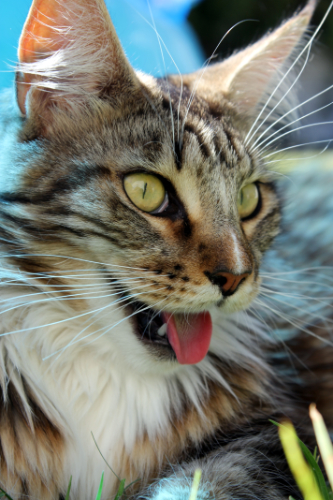
Good luck!
Hopefully you will soon find out why your cat is breathing heavy and it can be cured. We whish your both good luck!




